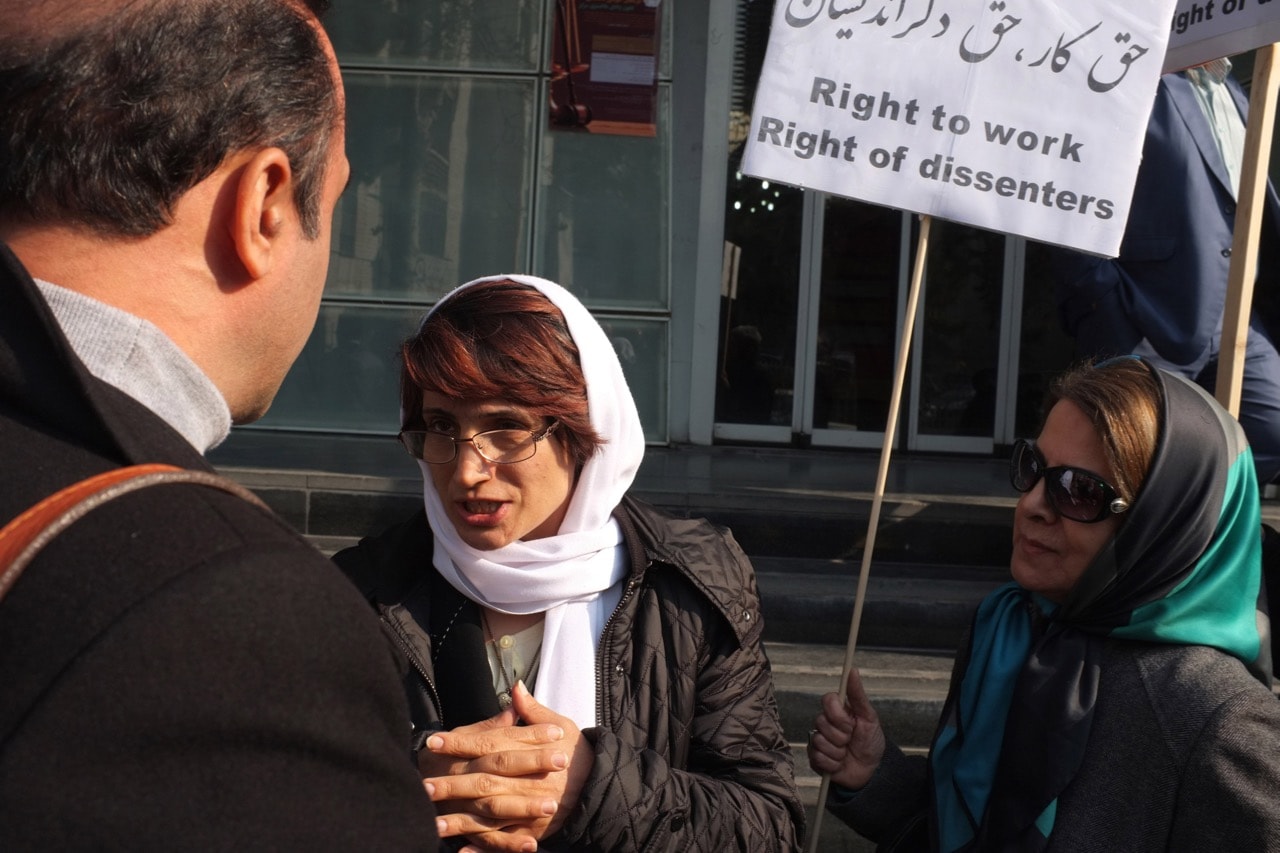Well-known human rights lawyer Nasrin Sotoudeh went on hunger strike on 25 August 2018 to protest poor treatment of family and friends since her arrest in June.
This statement was originally published on gc4hr.org on 30 August 2018.
Well-known human rights lawyer Nasrin Sotoudeh went on hunger strike on 25 August 2018 to protest poor treatment of family and friends since her arrest in June, according to a post on her husband Reza Khandan’s Facebook page. Among her complaints was the arrest of Dr. Farhad Meysami, a doctor and human rights defender, who supported the protests against forced hijab.
The letter from Sotoudeh reads: “Following my arrest two months ago, the Ministry of Intelligence officials, in an illegal act, not only arrested a well-educated citizen, Dr. Farhad Meysami, but also searched my house and those of relatives and friends to discover evidence of protest against the forced veil. The agents did not find anything when they searched my husband’s sister’s house at the last moment, and their satellite receiver went dead. Since all my letters to the authorities have been in vain, I have been forced to carry out a hunger strike in protest of the arrests and pressures against my family, relatives and friends since August 25.”
Soutedeh signed it: “With hope for the establishment of law and justice in our beloved Iran.”
On 13 June 2018, Sotoudeh was taken from her home in Tehran. During the interrogation, she was told that the charges against her are “propaganda against the state,” for allegedly being a member of LEGAM, an NGO opposed to the death penalty, and “assembly and collusion against national security.” The charges could incur a five-year prison sentence.
Reports suggested that her detention comes following her legal representation of women arrested in Iran for peacefully protesting against the Islamic Republic’s compulsory hijab law, and for criticising the judiciary. Click here for more info.
Meysami was arrested on 31 July 2018 for wearing a badge that says “I am against forced hijab.”
Sotoudeh represents at least two women detained for refusing to cover their hair in public. Since December 2017, dozens of women have been arrested for removing their hijab during regular protest campaigns under hashtags including #mystealthyfreedom, #whitewednesdays, #girlsofenghelabstreet and #mycameraismyweapon.
The Gulf Centre for Human Rights (GCHR) expresses serious concern at the continued targeting and harassment of human rights defenders in Iran including Nasrin Sotoudeh and Dr. Farhad Meysami. GCHR expresses particular concern for lack of civic space in the country.
GCHR urges the authorities in Iran to:
1. Immediately and unconditionally release Nasrin Sotoudeh and drop all charges against her;
2. Guarantee the physical and psychological integrity and security of Nasrin Sotoudeh while she remains in detention, including ensuring she received the medical attention needed during a hunger strike;
3. Provide human rights defenders with a safe civic space in which to conduct their work;
4. Stop arbitrarily arresting and intimidating human rights defenders as a result of their participation in peaceful human rights activities; and
5. Guarantee in all circumstances that all human rights defenders in Iran are able to carry out their legitimate human rights activities without fear of reprisals and free of all restrictions, including judicial harassment.
GCHR respectfully reminds you that the United Nations Declaration on the Right and Responsibility of Individuals, Groups and Organs of Society to Promote and Protect Universally Recognised Human Rights and Fundamental Freedoms, adopted by consensus by the UN General Assembly on 9 December 1998, recognises the legitimacy of the activities of human rights defenders, their right to freedom of association and to carry out their activities without fear of reprisals.
We would particularly draw your attention to Article 6 (b and c): “Everyone has the right, individually and in association with others: (b) As provided for in human rights and other applicable international instruments, freely to publish, impart or disseminate to others views, information and knowledge on all human rights and fundamental freedoms; (c) To study, discuss, form and hold opinions on the observance, both in law and in practice, of all human rights and fundamental freedoms and, through these and other appropriate means, to draw public attention to those matters”, and to Article 12 (1 and 2): “(1) Everyone has the right, individually and in association with others, to participate in peaceful activities against violations of human rights and fundamental freedoms. (2) The State shall take all necessary measures to ensure the protection by the competent authorities of everyone, individually and in association with others, against any violence, threats, retaliation, de facto or de jure adverse discrimination, pressure or any other arbitrary action as a consequence of his or her legitimate exercise of the rights referred to in the present Declaration.”



